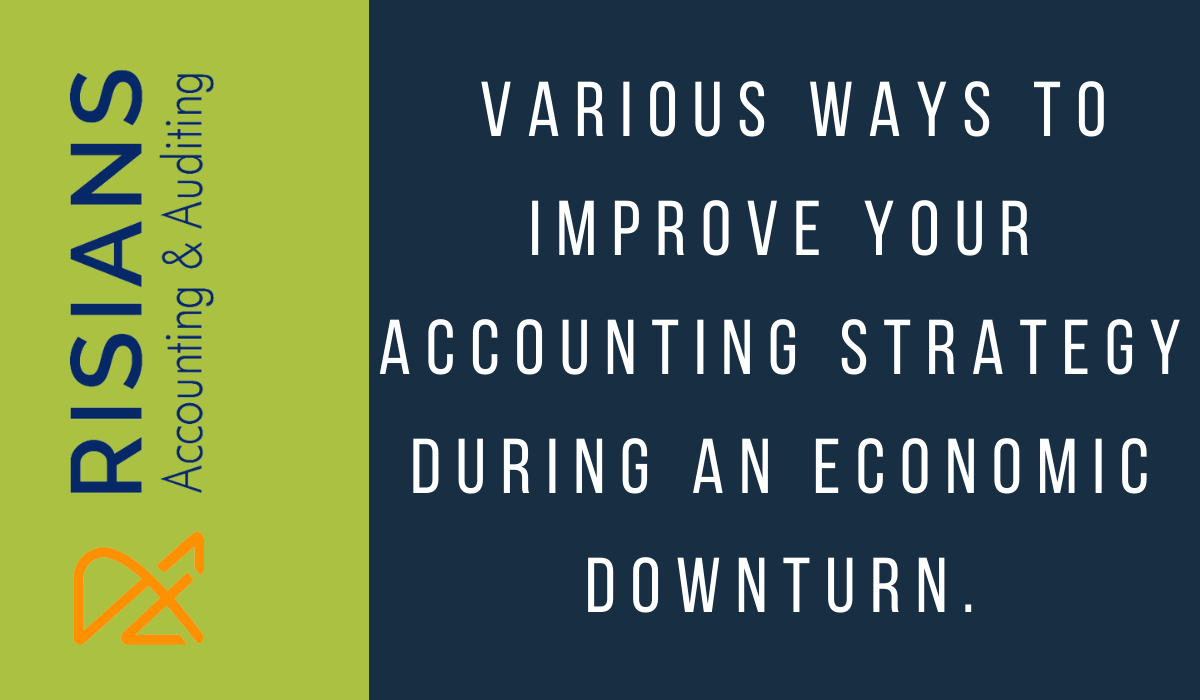- Accounting
- 2021-12-05
- Mr. Wasim Firoz
Various Ways To Improve Your Accounting Strategy During An Economic Downturn.
During these difficult times of the Coronavirus pandemic, there has been a lot of discussion about the different government programs available to help small businesses weather the storm. However, there are several internal things that businesses can do to help them make it through an economic downturn. Below are the actions that all businesses should be doing during a downturn in the economy.
1. Adjust your strategy and long-term goals. - While focusing on putting out fires in the short term is important, your business plan should focus on long-term business continuity and profitability. Your accounting team is there to help you sort out your options.
Look at the profitability of each of your products and services. Is everything profitable? Are some products or clients more profitable than others? Have your accounting team do a thorough financial analysis, and use the results to build a new, more profitable business strategy.
2. Know where you’re making and losing money - Revise your revenue forecast to factor in the current economic climate so you have real numbers in your budget for the rest of the year. Consider which of your products, services or clients are profitable.
For one of our clients, our accounting team assessed the profitability of each of its customers and products. Through this analysis, we suggested variable-based pricing and to shift its sales and marketing to its most profitable customers. In less than two months, it removed 20% percent of its customers so that it could focus on the more profitable ones.
At first, this might sound like a loss, but cutting the least profitable clients actually took this client out of the red, and its revenue didn’t drop at all. Once it had a clear picture of who its most profitable clients were, it narrowed the focus of its new client outreach. The result? Its compounded annual growth increased by 40% per year.
3.Get aggressive with collections - According to the partner of a consulting firm, "when business is good, companies tend to become lazy about collecting on receivables. This can prove dangerous in a recession." Assume that the average collection period for your industry is 45 days, but your company is at 51 days. After bringing that collection period down to the industry average, keep working to get it down to 40 days. Being tough with customers may be unpleasant, but it's an important safeguard against the effects of a prolonged economic Downturn.
4. Ask yourself what your business truly needs - The Covid-19 pandemic has made us reflect on the merits of what we buy, asking ourselves, “Is this product really essential”? Ask yourself about your overall operating costs, especially those that are recurring month over month. Look at your credit card statement; for each item, ask yourself: Would I buy this again? If the answer is no, cut it. Cut recurring subscriptions you hardly use. Are there items that just keep hitting your credit card that you don’t really need? Do you know your margins? How can you maximize those margins?
Do make sure not to cut the wrong things. To foster business growth, consider putting more into business development and marketing. Don’t cut anything that helps you minimize risk, such as insurance, which can be a lifesaver if the unexpected occurs.
5. Focus on Quality - Don’t let being understaffed impact your level of service and quality of your product. Options include freelancers, consultants, and part-time employees. One advantage of a slowdown is that hiring gets easier because there are more candidates from which to choose due to layoffs and other cutbacks.
6. Manage Inventory Balances - Typically, during a slowdown, there is an imbalance between sales and overstocked inventories. One possibility is converting inventories into cash. Monitor the results, keeping an eye out for those products that can tolerate even leaner inventories or that should be eliminated from your stock. This way if sales drop significantly, less of your cash is locked into unproductive assets.
7. Analyze Your Pricing - A recession is the last time you want to increase your pricing, so understanding your cost structure is essential to drive down costs and optimize profits. If your cost analysis shows that your current pricing is not enough to cover costs and provide a reasonable profit, you must find ways to be more efficient rather than increasing your price.
8. Ask what you need right now and define your backup plan - How and when are you receiving your cash, and when do you need it? Compare this to your revenue forecast. Where can you reinvest? If you see cash-flow issues, can you renegotiate payment dates with your vendors or offer to make payments in chunks? Your accounting team can help you get creative without burning bridges with your long-term business partners.
If cash is tight, what’s your backup plan? Maybe you can acquire a line of credit from a bank or gain family or friend funding, an SBA loan, or one of the government’s current programs, such as a Paycheck Protection Program or EIDL loan. For government programs, your accounting team needs to be well versed in the specifics so you don’t miss out on a loan because of a clerical error. Some outsourced accounting firms also have special relationships with banks and can help you access capital.
If you are looking for best accounting firm in dubai who have talented accounting team then risians accounting is the best UAE accounting firm.
Leverage your accounting team and consider “zero-based budgeting,” which helps you to assess what’s essential and what’s not. With their help, you can create the foundation for a strategy that helps you get through this difficult time so you come out highly competitive and ready for growth.
Accountants are available to help small businesses survive through these difficult times. If you can’t complete this process internally or don’t have qualified accountants on your team, consider outsourced accounting and HR services. Many companies hire outsourced back-end office teams because for the same cost as a full-time person, they can provide specialists who work with you to find more technical and nuanced solutions.
Regardless of your strategy, speak with your accounting team about these ideas, and find out what their plan of attack is. If they are not able to help you develop a business continuity strategy and future goals, then they may not be the right team to help you survive the current economic downturn.





















